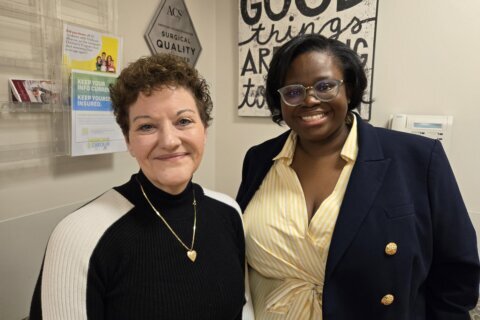By the time a patient is newly-diagnosed with lung cancer, many already have stage three or stage four cancer.
During Lung Cancer Action Week, Dr. Albert Rizzo, the medical director of the American Lung Association says that’s one of the confounding attributes of the leading cause of cancer deaths.
“Unfortunately, symptoms of lung cancer do not present early,” said Rizzo. “By the time somebody has chest pain, chronic cough, spitting up blood, shortness of breath — if those are the symptoms, at that point it’s usually in a more advanced condition.”
It was a lesson I personally learned, in November 2022, after a persistent cough led to my diagnosis of lung cancer.
Currently, the only people who qualify for lung cancer screening are people between the ages of 50 and 80, who have smoked a pack of cigarettes a day for 20 years. And, while 14 million people qualify for screening, Rizzo says recent figures show only approximately 5% to 7% of people who qualify, avail themselves of the low intensity CT scan, which can find potential problems when they are only a few millimeters in size.
As a never-smoker, I was one of the growing number of people diagnosed with stage 4 lung cancer. Since my diagnosis, after one-pill-a-day targeted therapy, and a robot-assisted lobectomy, I currently have “no evidence of disease,” five months after diagnosis.
While the CT scan is the current approved screening method to detect evidence of cancer in at-risk patients, “right now we have no test that will show that, that can be recommended across the board.”
However, new diagnostic tests are helping doctors detect cancer earlier.
“Liquid biopsies will look for, not only signs in the blood of lung cancer, but multiple cancers, that may be detected based on fragments of DNA, which are part of the cancer cells that got into the bloodstream,” said Rizzo
“There’s also breath analysis being looked at to show that different proteins make a different breath analysis when somebody has lung cancer,” he said.
Rizzo said there is a distinction between a screening test available to people without symptoms, and a diagnostic test, based on a patient’s abnormal previous scans. Typically, insurance will cover approved screening tests, but diagnostic tests can depend on individual health insurance policies.
However, Rizzo encouraged patients to talk with their doctors.
“They can say to their doctor that they’re concerned about the possibilities of having lung cancer, based on the fact that their mother or father died of lung cancer, or based on the fact that they were exposed to asbestos.”
The American Lung Association’s Lung Cancer Action Week runs through May 14.








